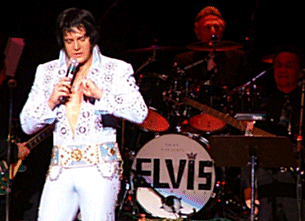Sixties
City presents
a wide-ranging series of
articles on all aspects of the Sixties, penned by the creator of the iconic
60s music paper Mersey
Beat
|
Sixties
City presents
a wide-ranging series of
articles on all aspects of the Sixties, penned by the creator of the iconic
60s music paper Mersey
Beat
|
||||||
|
 |
This
second documentary featuring Elvis was produced by Pierre Addidge and directed
by Robert Abel, who were to say, "Elvis was guarded at first. He's a very
private and, in some ways, shy person. The candid interviews with Elvis
were used as the narrative thread throughout this documentary, with Elvis'
voice heard over footage of his concerts and family stills. It also includes
footage from his early career, such as his debut on ‘The Ed Sullivan Show’."
The 93-minute concert film, which was first known as ‘Standing Room Only’, went on general release in America on 1st November 1972 and focussed on his 15-city tour in the spring of 1971 which began in Buffalo, New York, and ended in Albuquerque, New Mexico. In some areas it was shown on a bill with ‘Elvis – That’s The Way It Is.’ Excluding Elvis’ million dollar fee, the movie cost $600,000 to make and proved to be successful financially, being said to have recouped its costs after only three days of release. The documentary was nominated for a Golden Globe as Best Documentary of 1972 – and won it. Elvis was watching the ceremony on television in his bathroom at the Las Vegas Hilton and his friends in the other room heard him shout out, “My God! Sonofabitch! We’ve won! We’ve won the Golden Globe!” The Metro Goldwyn Mayer film was photographed by Robert Thomas and featured a montage supervised by Martin Scorsese. Elvis’s ‘Memphis Mafia’ and his father were included in the credits as Elvis' Assistants; Vernon Presley, Joe Esposito, Jerry Schilling, Sonny West, Red West, James Caughley, Lamar Fike, Marvin Gamble. The musicians with Elvis were: James Burton, Charlie Hodge, Ronnie Tutt, Glen Hardin, Jerry Scheff and John Wilkinson. The Orchestra was conducted by Joe Guercio and the background vocals were by Kathy Westmoreland, The Sweet Inspirations and J.D. Sumner and the Stamps Quartet. The opening act was Jackie Kahane. A soundtrack album of the movie was planned, but never released. |
|
‘Johnny B. Goode’ (penned by Chuck Berry which was played over the opening
credits) ‘See See Rider’ (written by Ma Rainey and Chuck Willis) ‘Polk Salad Annie’ (written by Tony Joe White) ‘Separate Ways’ (written by Red West and Richard Mainegra) ‘Proud Mary’ (written by John Fogerty) 'Never Been To Spain' (written by Hoyt Axton) 'Burning Love’ (written by Dennis Linde) ‘That’s All Right, Mama’ (written by Arthur Crudup) 'Lead Me, Guide Me' (written by Doris Askers, a spiritual performed during a rehearsal) ‘Bosom of Abraham’ (written by William Johnson, George McFadden and Ted Brooks) ‘Love Me Tender’ (written by Elvis Presley and Ken Darby) 'Until It’s Time for You To Go’ (written by Buffy Sainte Marie) ‘Suspicious Minds’ (written by Mark James) ‘I, John’ (written by Johnson, McFadden) 'Bridge Over Troubled Water’ (written by Paul Simon & Art Garfunkel) 'Funny How Time Slips Away’ (written by Willie Nelson) 'An American Trilogy' (This was a traditional number, arranged by Mickey Newbury, and was a combination of ‘Dixie’, ‘All My Trials’ and ‘Battle Hymn Of The Republic’. It became a trademark of Elvis' shows) ‘Mystery Train’ (written by Sam Philips and Junior Parker) 'I Got A Woman'/'Amen' (‘I Got A Woman’ by Ray Charles - ‘Amen’ by John W. Pate Sr. and Curtis Mayfield and usually performed as a medley at the end of ‘I Got A Woman’) ‘A Big Hunk O’ Love’ (written by Sid Wyche and Aaron Schroeder) ‘You Gave Me A Mountain’ (written by Marty Robbins) ‘Lawdy Miss Clawdy’ (written by Lloyd Price) ‘Can’t Help Falling In Love’ (written by Hugo Peretti, Luigi Creatore and George Weiss) ‘Memories’ (written by Scott Davis and Billy Strange - and played over the closing credits) ‘Lighthouse’ (sung by J.D.Sumner and the Stamps Quartet) 'Sweet Sweet Spirit' (sung by J.D.Sumner and the Stamps Quartet) ‘Don’t Be Cruel’ (written by Otis Blackwell, it was featured as a TV clip) ‘Ready Teddy’ (written Robert Blackwell and John Marascalo) This was Elvis’s 33rd and final movie and ends with the words from the compere: “Elvis has left the building” |
|
|
Article
|